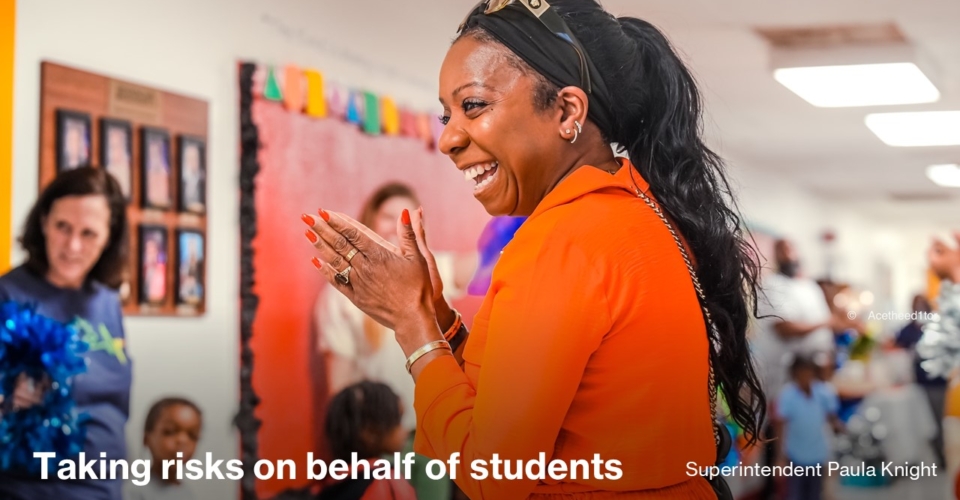K12 leaders head to the DALI Superintendents Summit to share success stories and find solutions to common challenges. This fall in Tucson, teacher shortages and superintendent longevity were top of mind but so were issues—such as test scores—that haven’t been getting as much attention as of late.
Here’s what superintendents and other administrators had to say at this November’s DALI summit about some of the most critical topics educators will contend with now and in the new year.
1. What’s keeping you up at night?
“Staffing, of course,” was the response from Jamar Perry, the associate superintendent for curriculum and instruction and student services at Granville County Public Schools in North Carolina. His district is offering longevity bonuses, mentoring and professional development to attract and retain staff who are willing to put in the work to ensure students become proficient in the core subjects.
Charlottesville City Schools in Virginia has not been able to offer some upper-level courses due to teaching vacancies, adds Superintendent Royal A. Gurley. He worries shortages will worsen as higher salaries in the private sector lure more and more employees away from public education.
And it’s a problem technology may not be able to solve. “It’s going to cripple a lot of school divisions,” Gurley asserted. “Doing it virtually, getting a virtual teacher is not going to be sufficient, especially for our most vulnerable learners. They need a teacher in the classroom.”
2. What keeps you going?

Districts are also contending with a higher-than-normal rate of administrative turnover in recent years. But not the Metropolitan School District of Washington Township in Indiana, where Nikki C. Woodson has been the superintendent for 15 years. So what keeps her motivated?
“Easy answer: 110% the kids, and the kids’ progress, and their remarks when they come back from college and share insight into their K12 experience,” Woodson explained.
A recent college graduate who’d had a disciplinary problem while still in the district recently told Woodson she’d kept a note of encouragement that the superintendent wrote her at the time. The student kept the note taped to her mirror for all four years of college.
“I said ‘Hey, this is not who you are. Think about your future, focus on that, make choices thinking about your future,’” Woodson noted.
Kenneth Dyer, who has been superintendent of the Dougherty County School System in Georgia for seven years, has a go-to destination when he needs encouragement. “When I’m having a bad day, I go to our pre-K center,” Dyer explains. “That lets me hit the reset button. It helps me remember that I do this for the kids and to create opportunities so they will have a successful future.”
3. How are you supporting students’ mental health?

A recent survey Dougherty County survey returned some “alarming numbers” about students’ mental health struggles. The good news is that the district applied for and received a five-year, $15 million grant from the U.S. Department of Education that has allowed Dyer to hire 17 behavioral health support staff.
“One thing we’re laser-focused on is making sure we provide an environment that’s safe and supportive,” he says. “The framework we have and the foundation we’re laying is promising.”
4. What exciting new academic programs are you offering?
The new dual-language immersion program at Granville County Public Schools gets students started learning Spanish in kindergarten, with the goal of having them become proficient by third grade. And in Charlottesville City, urban gardening is showing students the practical applications of core subjects such as math and science.
More from DA: How a superintendent’s “Dr. Hannigan’s Shenanigans” videos became a big hit
“Students are growing things in the garden and eating them in the cafeteria,” Gurley noted. “It’s about sustainability and renewable energy. Hands-on learning is bringing it to life.”
5. Is anyone thinking about test scores anymore?
The answer is “yes,” according to Michael Porter, superintendent of the Omak School District in Washington. Porter has hired new instructional coaches for his elementary and middle schools so educators can take a deeper dive into the achievement data. The goal is to get support to students at the first sign that they are struggling. “Instead of just sitting and stewing, we said, ‘Let’s come up with some solutions,” Porter said.
6. Upping your communications game
The Omak School District is preparing to put a levy on the February ballot to renew operating funds for the next four years. Porter has been appearing on the radio regularly and posting on social media to raise awareness. His latest initiative is “Soup With the Supe”—an hour-long forum where parents and community members will be served dinner as they ask questions about the district’s ongoing initiatives.
He also meets community members for coffee as often as possible. “I don’t always hear from people not connected to the schools,” Porter adds. “I want people to feel like if they see something that doesn’t sound like Michael, I’m going to give him a call or I’m going to stop by and talk with him.”
7. And isn’t it time to embrace artificial intelligence?

AI is “the catalyst education needs to force change,” says Jeff McCoy, associate superintendent for academics at Greenville County Schools in South Carolina. Recent advances in artificial intelligence will allow educators to more accurately assess student learning and better personalize instruction to each learner’s needs.
Districts will have to prepare teachers to train students on the appropriate and ethical use of AI—but that’s not the only promise the technology holds for K12. “It’s a tool that needs to be embraced for teachers’ own well-being,” he concludes. “There are so many ways it can help them save time and be more efficient.”



